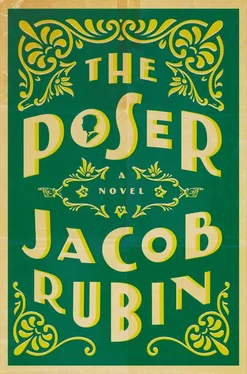He ground out his cigarette, a favorite maneuver of his when approaching the coup de grâce. “About Lucy and me?” He laughed to himself. “Hell, I was hoping you’d hear about it. Really, what interest could I possibly have in a piece of ass like that? No, I was thinking of you , Giovanni. I got hard thinking of you : how you of all people thought you could have a girlfriend. Really, you think you’re gonna find some sweet little piece and sit by a lake and exchange rings? No, the family you’ve been allotted is the audience, the public, voters, customers — whatever the fuck you wanna call them. They alone preserve you, you understand that? Because you’re imaginary . Get it?”
“Sounds good.”
I stood and emptied the ashtray into the kitchen trash. When ballplayers say of a home run, “I knew as soon as it left the bat”—so I felt after this remark. Bernard tried some things, even patted me on the back. “Anyway, we’ll talk more about it,” he said as he left. “Absolutely,” I answered, with a grin. If his goal had been to make this sound bad, he had failed, for what could be better than becoming fictional?
That night, or one soon after, I wrote a letter to Mama explaining that she was not to visit. Calls followed. Letters. Most I tore up without reading. I knew what they would say. In fact, I almost mailed her a parody of my own, a note riddled with oh, my boy s, and I was only trying to help you s. That gray prison in Dun Harbor. All those years I’d passed it on my way to the train station, and my father, my namesake, had been there.
At Nathan Sharp’s mansion, in that alcove with paintings of flamingos, Max said, “Goddamnit! He’s using you, don’t you see? He’s gonna have you get into office and use you.”
That was one moment I wished I could have seen on camera (or viewed in the mirror or, for that matter, read about in the paper) because I knew I took the right amount of time. “And what use do you have?” I asked. And Max was such an unwitting actor — he huffed, shook a fist, even turned one last time to shake his fist again before tramping down the hall, and away, it turned out. Later that night, I did it again in front of the mirror.
• • •
From the wings we could hear the herd of reporters: jittery-kneed, pens-at-the-ready, like the old crowds at the Communiqué.
Bernard and Lou waited backstage with me, as did Michael Martet, the owner of the theater. When we first met, Martet had subjected me to his gratitude, squeezing my hand at this rhythm: down, up, down (held), then a pat on the back, down, up, down (held), pat on the back. “This sure means a lot, Mr. Bernini,” he said six times. Martet was a head shorter than I was, his face forgettable except for a colorful and bulbous nose. Like a Christmas ornament on a thin stem, plum-shaped and plum-colored, it lent to his restless person an availability of spirit. The nose was meant to be shared. “This sure means a lot” accounted for ninety percent of what he said to me, and I was pleased when he left me in order to pace by Lou. For a long time I remembered his nose. Because of what happened, I remembered and wondered if there had been signs in it.
I was worried the feeling would come. I worried about this often. When I had greeted my opponent with a mean vigorous shake, for instance, equidistant from our podiums before the moderator, a silhouette from waist to head like a target at a shooting range. Or at the VA hospital when shredded, hopeful men thanked me as I came around and at the Jade House, where I knew how everything looked because I had practiced in the mirror taking off my belt and cumming. When admirers outside the rally in Redwood Park swaddled my back or when they reached over several rows of people unself-conscious to grab my hand, I thought then, surely, the bursting feeling would come, and at the condemned house, too, where the photographers broke their bulbs over me and the men without jobs smiling. At a fund-raiser in the hills, when it happened, I pretended it was something I ate. The pills by then didn’t always help. A butler led me to the upstairs bathroom, where my expression in the mirror looked only slightly puzzled. Relieved, I lay in the cold hard tub, the murmur of party guests below. It was this way. Some expressions felt like shotgun blasts to the nose but weren’t really so bad when you took them to the mirror. Tearing up her letters, for instance. Or waking from a dream of rattling grates and dumb heads bobbing through slatted shadows. “An inspiration to the conservative majority, if still a mystery to many…” the newscaster said in his professional voice. The television made Bernard’s grinning face the same blue it made all the hotel suite, lively at the time with balloons and jubilant people whose names I didn’t know applauding.
Now we stood at the backstage of the abandoned Jupiter Theater. Bernard had selected it as the site of my first address as governor-elect. A symbol of decay, soon to be resurrected, was the idea. The cobwebs in the rafters were thick. Light bored through the warped paneling. This was not the place I wanted to be: in that musty backstage speared through by light, and yet I could think of no better place. I riffled through all the places I’d been, and none was the right place. More and more this was the feeling. I was not dreading the press conference. If I could dread certain places, like that neglected theater, it would spur me to find the better place, if only as a kind of negative search.
When Bernard and Senator Stengel took the stage, a hubbub broke out in the theater. The two sat at a microphone-laden table. The photographers’ bulbs flashed. Stengel was beginning his introductory remarks when Mr. Martet tapped me on the shoulder with news of a phone call.
The short walk to the office, Martet expressed his surprise that the man on the other line could track down the number. On his metal desk sat the heavy receiver.
“I’ve been trying to reach you all day.”
I said nothing.
“It’s Ken,” the voice said. “Ken Kessman. Your mother’s neighbor.”
“Go on.”
“The police… Giovanni, there’s been a… he tried to rob her…”
I said nothing.
“Giovanni — Jesse Unheim — he—”
When I walked onto the stage, the reporters shouted. Their flashbulbs cut me like glass. “You’re not supposed to come out yet,” Bernard said, looking over his shoulder at me.
“My mother was shot,” I told him. “She’s dead.”
Bernard looked like he might speak when I punched the back of his head. I yanked his hair until his chair toppled over, I shoved his face into the stage, punching it again when the stage broke under us, and we landed in cold dirt. I punched him until my hands were bleeding, and then I reached into my jacket for the gun. Against his forehead I put the nose and cocked the hammer. It clicked. I pulled it again. “A toy,” Bernard said, when I was scooped up by the armpits. Lou was holding me, suspended over the crater in the stage, flailing like a swimmer stolen out of the water, while the reporters made the cameras perpendicular to their faces. A sound was coming from inside the hole in the stage: Bernard, on the ground, his teeth pink with blood, like some half-fleshed skeleton. “A toy,” he said.
I woke to two men in white scrubs standing over my cot. “Ready, Mr. Bernini?” the stocky one said.
My body heeded the routine. Without my consent, it followed the men out of the room. They would lead it down the bright hall and stairs to the cafeteria, illuminated, like all of the building, by a floor-to-ceiling window. There it would swallow the pills the men gave it, and be gathered by these pills into a body. When it called to its arm, that arm moved! It could stretch and yawn! But the afternoon would age, and over the body would come a wan and wintry feeling. Fractures would open in its fingers and around its ankles, fissures so small it never failed to surprise the body when these cracks spread to its knees and neck. Soon its legs would shear off at the knee, and the body did its last bad running-up to its room, to its bed, where it could, in privacy, fall apart.
Читать дальше












